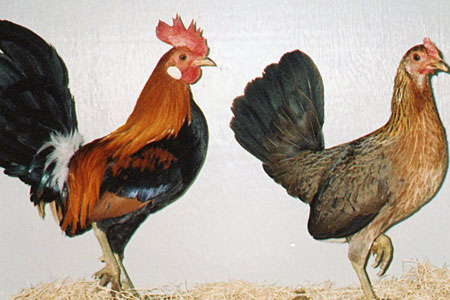
The average well-cared-for chicken may live 8 to 10 years. Some chickens survive 15 years or more. Many factors contribute to a chicken’s longevity. Some of these factors relate to genetics. Other factors have to do with good management.
Guinness Records
The first chicken recognized by Guinness World Records as the World’s Oldest Living Chicken was an Old English Game bantam hen Matilda. Hatched in Alabama in 1990, Matilda died in 2006 at the age of 16. Contributing to her longevity were the facts that she lived a protected life indoors and she never laid eggs.
The current World’s Oldest Living Chicken is Peanut, a Belgian d’Uccle/Nankin cross hatched in Michigan in 2002. Peanut spent her first two years indoors, then lived outside with other chickens. She laid eggs until she was 8 years old. These days she spends summer months outdoors and winter months indoors.
The first chicken to be recognized by Guinness World Records as the World’s Oldest Chicken Ever was Muffy. The American Game bantam hen hatched in Maryland in 1989 and died in 2011 at the age of nearly 23 years. Muffy, like Matilda, lived in an entirely protected environment and also laid few eggs.
Chickens that Live the Longest
Other world record contenders were also bantams. The obvious conclusion is that bantams tend to live longer than the larger breeds. That makes sense when you consider that all our current chicken breeds derive from jungle fowl. Long-lived jungle fowl are small birds weighing in the range of one to three pounds, about the same range as bantam chickens.
Anecdotally, the game breeds in general are noted for their longevity. Factors that contribute to a long life include:
- Genetic diversity. Breeds with a large gene pool, including mixed breeds, tend to live longer than chickens that are inbred for show quality or superior egg production.
- Safe housing. Chickens remain healthier in clean housing with good ventilation but not drafty, that protects them from the elements so they are warm in winter and cool in summer, offers plenty of opportunities to exercise and to engage in typical chicken activities, and protects them from predators.
- Low egg production. Laying large numbers of eggs is physiologically stressful for high producing hens, contributing to decreased longevity.
- Proper diet. Good nutrition goes a long way toward maintaining health and increasing longevity. The keeper of Peanut, the current oldest living chicken, attributes the hen’s longevity in part to a healthy diet that includes yogurt and occasional fresh produce.
- Health care. Chickens that live the longest are rarely bothered by parasites and diseases, most of which are preventable through good management.
- Freedom from stress. Safe housing, proper nutrition, excellent health care, and other elements of good management all help reduce stress in a chicken’s life and contribute to the bird’s survivability and ultimate longevity.
And that’s today’s news from the Cackle Coop.
Gail Damerow has written numerous books about poultry, including The Chicken Encyclopedia.

